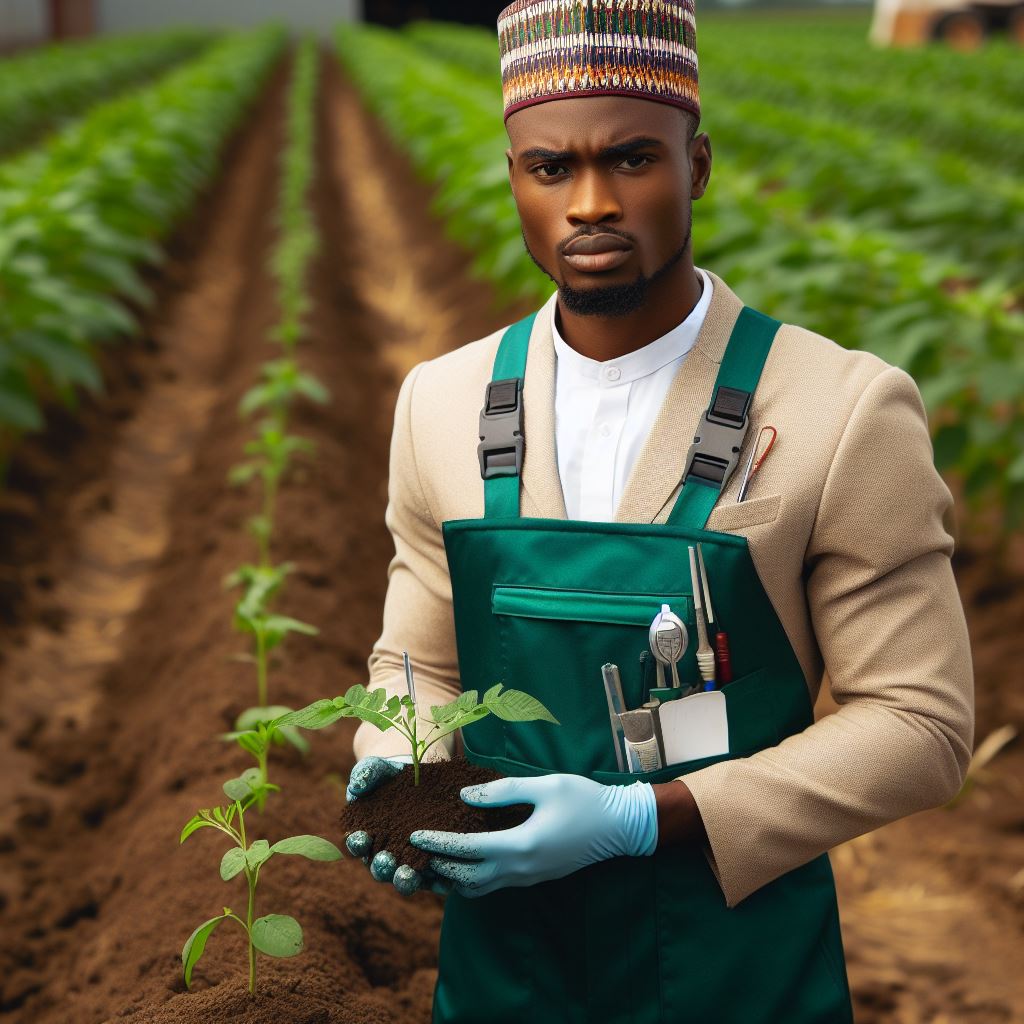Introduction
In the vibrant landscape of agricultural innovation, Nigeria stands poised to cultivate a new generation of experts through postgraduate opportunities in crop science.
Embarking on advanced studies in this field is not merely an academic pursuit but a gateway to transformative contributions in the nation’s agricultural sector.
Amidst the dynamic challenges faced by the agricultural landscape in Nigeria, the significance of delving into postgraduate studies in crop science becomes evident.
This field holds the key to unlocking sustainable solutions for food security, crop yield optimization, and agribusiness development.
As we delve into the heart of postgraduate opportunities, aspiring scholars will discover a rich tapestry of specialized programs tailored to the unique agricultural context of Nigeria.
From advanced crop breeding techniques to cutting-edge precision agriculture, these programs offer a comprehensive education that goes beyond theoretical knowledge.
The urgency of addressing issues such as climate change, soil degradation, and pest infestations underscores the vital role that well-trained crop scientists can play.
Postgraduate studies empower individuals to engage with these challenges head-on, fostering a new wave of research and innovation that is urgently needed in the agricultural sector.
In a country where agriculture is a cornerstone of the economy, the demand for skilled professionals in crop science is escalating.
Pursuing postgraduate studies not only equips individuals with the expertise to tackle agricultural complexities but also positions them as leaders in shaping the future of Nigeria’s agrarian landscape.
In fact, the journey into postgraduate opportunities in crop science in Nigeria is a gateway to a realm of possibilities.
It is a call to action for those who aspire to be at the forefront of agricultural advancements, contributing to a sustainable and resilient future for Nigeria’s agricultural sector.
Overview of crop science in Nigeria
The agricultural sector in Nigeria
In Nigeria, agriculture plays a significant role in the country’s economy and the lives of its population.
The agricultural sector in Nigeria is the largest employer of labor, contributing to the livelihood of many people.
It is a major source of food for the population and an important contributor to the country’s GDP.
Transform Your Career with Expert Guidance
Get personalized mentorship consulting that’s tailored to your unique path. Our expert advice is actionable and exclusive.
Get StartedAgriculture in Nigeria is diverse, with various crops cultivated across the different regions of the country.
Crop science is a branch of agricultural science that focuses on the study of crops and their production.
It plays a crucial role in addressing food security by enhancing crop yields and ensuring sustainable farming practices.
With a growing population, the demand for food is increasing, and crop science helps to meet this demand.
By studying crops’ genetics and improving their traits, crop scientists develop more resilient and productive varieties.
They also research effective pest and disease control measures to protect crops and maximize yields.
The importance of crop science in addressing food security and promoting economic growth
Crop science contributes to food security by increasing agricultural productivity and reducing crop losses.
In addition to addressing food security, crop science also promotes economic growth in Nigeria.
Agriculture is a major source of income for many people in rural areas, where farming is the primary occupation.
Investments in crop science research and technology have the potential to increase farmers’ incomes.
By adopting improved crop varieties and farming techniques, farmers can experience higher yields and better market opportunities.
Crop scientists also play a role in value addition and agribusiness development, contributing to job creation and economic growth.
Furthermore, crop science research can lead to the development of new industries and agro-based products.
For example, the cultivation of high-value crops such as cashew and cocoa can generate additional revenue for the country.
Transform Your Ideas Into Impactful Words
Struggling to express your thoughts? Let us craft academic papers, articles, or blog posts that captivate, clarify, and connect with your audience.
Get StartedIn short, crop science is of utmost importance in Nigeria for addressing food security and promoting economic growth.
Through research and innovation in crop science, the country can increase agricultural productivity and improve farmers’ livelihoods.
Investments in crop science education and research institutions are crucial to harnessing the full potential of the agricultural sector and ensuring a sustainable future for Nigeria.
Read: Student Experiences: Studying Crop Production in Nigeria
Available postgraduate programs in crop science
Embarking on a postgraduate journey in crop science opens doors to diverse opportunities for agricultural enthusiasts.
Several universities in Nigeria offer specialized programs, tailoring education to meet the growing demands of the agricultural sector.
The different universities and institutions in Nigeria that offer specific postgraduate programs in crop science
Ahmadu Bello University stands tall, providing a Master’s in Crop Protection, emphasizing sustainable pest management.
This program equips students with skills vital for safeguarding crops and ensuring high yields.
The Federal University of Agriculture, Abeokuta, takes a unique approach with its M.Sc. in Crop Production.
Focused on modern techniques, it hones expertise in optimizing crop yield through advanced agronomic practices.
For those fascinated by the intricate world of genetics, the University of Ibadan offers a specialized M.Sc. in Crop Breeding and Genetics.
This program delves into the science of creating superior crop varieties, contributing to food security.
Meanwhile, Obafemi Awolowo University stands out with its M.Sc. in Crop Physiology, designed to unravel the physiological processes governing plant growth.
Students gain insights crucial for developing resilient crops in varying environmental conditions.
Make Your Study Abroad Dream a Reality
Need help navigating the complexities of studying overseas? Let us guide you through the application and visa process, ensuring a smooth journey to your dream destination.
Get StartedThe specialization options available within these programs
Specialization options abound, allowing students to tailor their education. Whether delving into pest management, crop production optimization, or crop genetics, these programs cater to diverse interests.
This ensures a well-rounded education and cultivates experts ready to tackle the challenges of modern agriculture.
In essence, aspiring crop scientists in Nigeria have a plethora of postgraduate opportunities awaiting them.
By choosing programs that align with their interests and career goals, they can contribute significantly to the nation’s agricultural landscape.
These programs not only foster academic growth but also empower individuals to make a tangible impact on the future of crop science in Nigeria.
Read: Challenges Facing Crop Science Education in Today’s Nigeria
Admission requirements
Postgraduate studies in crop science offer great opportunities for students in Nigeria who are interested in furthering their education and research in this field.
In order to gain admission into these programs, there are certain general admission requirements that applicants must fulfill.
Additionally, specific entry requirements set by universities or institutions offering these programs should also be taken into consideration.
General admission requirements
- Applicants must possess a bachelor’s degree or its equivalent from a recognized institution.
- A minimum GPA of 2.5 on a 4.0 scale is usually required, although some universities may have higher GPA requirements.
- A good command of the English language is essential, demonstrated through a satisfactory score in English proficiency tests such as TOEFL or IELTS.
- Applicants should submit their academic transcripts and letters of recommendation from professors or employers who can attest to their qualifications and potential.
- A statement of purpose outlining the applicant’s research interests, career goals, and reasons for pursuing postgraduate studies in crop science is typically required.
Specific entry requirements
Universities or institutions offering postgraduate programs in crop science may have additional entry requirements specific to their program. Some of these requirements may include:
- Obtaining a minimum score in a standardized test such as the Graduate Record Examination (GRE) or the Agricultural Sciences Graduate Admission Test (AGGAT).
- Having a background or coursework in relevant subjects such as plant biology, agronomy, horticulture, or soil science.
- Prior experience or knowledge in agricultural practices, crop production, or plant genetics may be preferred.
- Some institutions may require a personal interview to assess the applicant’s motivation and suitability for the program.
The importance of a relevant undergraduate degree or background in crop science
Holding a relevant undergraduate degree or having a background in crop science is highly beneficial for postgraduate studies in this field. Here’s why:
- A relevant undergraduate degree provides a solid foundation of knowledge and skills necessary for advanced studies and research in crop science.
- Having a background in crop science allows students to have a better understanding of the subject matter, making their postgraduate studies more manageable and fruitful.
- It ensures that students are well-equipped with the fundamental concepts and principles of crop science, enabling them to contribute effectively to research and development in the field.
- A relevant undergraduate degree or background demonstrates the applicant’s dedication and passion for crop science, increasing their chances of being accepted into the postgraduate program.
- Students with prior knowledge in crop science may be eligible for exemptions from certain foundational courses, allowing them to focus on more advanced coursework and research.
In review, securing admission into postgraduate programs in crop science in Nigeria requires fulfilling both general admission requirements and specific entry requirements set by the respective universities or institutions.
Having a relevant undergraduate degree or background in crop science not only increases the chances of acceptance but also provides a strong foundation for successful postgraduate studies in this field.
Read: Fieldwork and Practical Exposure in Nigerian Crop Courses
Unlock the Full Potential of Your Research
Stuck in your academic research? Whether it’s data analysis, research design, or literature reviews, we offer expert guidance to elevate your work and ensure success.
Get Help
Scholarship and funding opportunities
When it comes to pursuing postgraduate studies in crop science in Nigeria, many Nigerian students may be deterred by the financial burden.
However, there are numerous scholarship and funding opportunities available to support their academic journeys.
In this blog section, we will highlight various scholarships and financial aid options that can help Nigerian students pursue their passion for crop science.
Government-funded scholarships
- The Federal Government of Nigeria offers scholarships to outstanding students pursuing postgraduate studies in various fields, including crop science.
- These scholarships cover tuition fees, accommodation, and a stipend to support living expenses.
- Students must meet specific eligibility criteria and undergo a rigorous selection process to secure these scholarships.
- Some popular government-funded scholarships include the Federal Government Scholarship Scheme and the Nigerian Agip Oil Company (NAOC) Scholarship.
Research grants and funding
- Many research organizations in Nigeria provide grants and funding for postgraduate students specializing in crop science.
- These grants support research projects, fieldwork, and the development of innovative solutions in crop science.
- Some prominent research organizations that offer funding opportunities include the Nigerian Institute of Agricultural Research, the National Agricultural Extension Research and Liaison Services, and the African Agricultural Technology Foundation.
International scholarships
- Several international organizations and foreign universities provide scholarships specifically targeted at Nigerian students.
- These scholarships cover tuition fees, research expenses, and sometimes even travel and accommodation costs.
- Some renowned international scholarships for Nigerian students pursuing postgraduate studies in crop science include the African Union Scholarship, the Commonwealth Scholarship, and the Chevening Scholarship.
Corporate sponsorships
- Many corporations and private companies in Nigeria have scholarship programs to support students in their academic pursuits.
- These scholarships may be offered by agricultural companies, agribusinesses, or organizations with a focus on sustainable agricultural practices.
- Some well-known corporate scholarships include the Nigerian Bottling Company (NBC) Scholarship and the Dangote Foundation Scholarship.
Financial assistance from universities
- Universities in Nigeria often provide their own scholarships and financial aid options.
- These scholarships may be merit-based or need-based, and students can inquire about them directly from their chosen institutions.
- Additionally, universities may offer work-study programs, teaching assistantships, or research assistant positions to support postgraduate students financially.
- Some universities that offer scholarships and financial assistance include the University of Ibadan, Ahmadu Bello University, and the University of Nigeria, Nsukka.
In a nutshell, Nigerian students pursuing postgraduate studies in crop science have a wide range of scholarship and funding opportunities to alleviate their financial burden.
Whether through government-funded scholarships, research grants, international scholarships, corporate sponsorships, or university scholarships, financial assistance is available.
It is crucial for students to explore these options, meet the eligibility criteria, and apply early to maximize their chances of receiving financial support for their academic endeavors.
Read: How Crop Production Tech is Evolving in Nigerian Schools
Research and Career Prospects in Crop Science
Embarking on postgraduate studies in Crop Science opens a realm of exciting research opportunities.
Postgraduate students delve into cutting-edge projects, exploring innovative solutions to agricultural challenges.
The research opportunities available to postgraduate students in crop science
Research avenues span various facets of Crop Science, from improving crop yield and resilience to unraveling the intricacies of pest management.
Graduate students actively contribute to scientific breakthroughs that reshape the agricultural landscape.
These research initiatives play a pivotal role in driving agricultural innovation, fostering sustainability, and ensuring food security.
By investigating advanced technologies, postgraduate scholars contribute to the development of resilient crops that can withstand environmental fluctuations.
Moreover, the intersection of technology and agriculture provides fertile ground for exploration.
Postgraduates in Crop Science delve into precision farming, harnessing the power of data analytics and remote sensing to optimize agricultural practices.
The potential career paths and job prospects for graduates in this field
As these scholars immerse themselves in research, their findings transcend academia, impacting the broader agricultural industry.
Graduates emerge not only as experts in their specialized fields but also as contributors to the global conversation on sustainable farming practices.
Upon completing postgraduate studies, a plethora of career paths beckons. Graduates find themselves in demand across sectors, from research institutions and government agencies to private agribusinesses.
Their expertise becomes instrumental in shaping policies and practices that influence the agricultural sector.
The importance of research for driving agricultural innovation and contributing to sustainable development
The importance of research in Crop Science cannot be overstated. It serves as the driving force behind advancements that propel sustainable development.
Postgraduate students, armed with knowledge and research skills, become catalysts for positive change, ensuring a brighter, more sustainable future for Nigeria’s agricultural landscape.
Challenges and Recommendations
Lack of Funding Opportunities
Postgraduate students in crop science in Nigeria face significant challenges regarding funding opportunities.
Solution: The government and private sector should increase funding options for students through grants, scholarships, and research assistantships.
Inadequate Research Infrastructure
The lack of proper research infrastructure is a major hurdle for postgraduate students in crop science.
Solution: The government needs to invest in upgrading research facilities, providing modern laboratories, and advanced agricultural technologies.
Limited Access to Research Materials
Postgraduate students often struggle to access essential research materials, including scientific journals and databases.
Solution: Universities and research institutes should enhance their library resources and establish collaborations with international institutions to provide access to digital research materials.
Poor Networking Opportunities
Postgraduate students in crop science lack sufficient networking opportunities with experts and professionals in the field.
Solution: Universities should organize conferences, workshops, and seminars to facilitate networking among students, researchers, and industry professionals.
Insufficient Supervision and Mentoring
Many postgraduate students in crop science face challenges due to inadequate supervision and mentoring.
Solution: Universities should ensure the availability of experienced supervisors and mentors who can guide students effectively throughout their research journey.
Inadequate Research Collaboration
Postgraduate students often face limited opportunities for research collaboration with other institutions or industry partners.
Solution: Universities and government agencies should promote collaboration by establishing partnerships with national and international institutions and encouraging industry collaborations.
Lack of Practical Training
Postgraduate students struggle with a lack of practical training, which is essential for applying theoretical knowledge in crop science.
Solution: Universities should incorporate hands-on training programs, internships, and field visits as part of the postgraduate curriculum to enhance practical skills.
Basically, the challenges faced by postgraduate students in crop science in Nigeria are diverse and require prompt attention.
By addressing funding opportunities, research infrastructure, access to research materials, networking, supervision, research collaboration, and practical training, the quality of postgraduate education in crop science can significantly improve in Nigeria.
Conclusion
We’ve explored vibrant postgraduate opportunities in Crop Science within Nigeria. We delved into the diverse specializations, highlighting the crucial role of advanced studies.
The blog shed light on the significance of these programs in fostering innovation and addressing agricultural challenges.
To sum up, the blog emphasized the relevance of pursuing higher education in Crop Science to develop a deep understanding of evolving agricultural trends.
This comprehensive insight equips individuals with the skills needed to tackle contemporary issues in the field.
In concluding remarks, it’s imperative to encourage aspiring professionals to actively consider the wealth of postgraduate programs available.
These opportunities not only enhance knowledge but also open doors to impactful research and development.
Individuals to explore these avenues, the blog recognizes the potential these postgraduate programs hold for personal and professional growth.
It reinforces the idea that contributing to the agricultural sector through advanced studies can significantly impact national development.
To reiterate, the blog advocates for the pursuit of excellence in Crop Science through postgraduate education.
Aspiring minds are urged to delve into these opportunities, fostering a spirit of curiosity and innovation.
By doing so, they become integral contributors to the advancement of agricultural practices in Nigeria.




